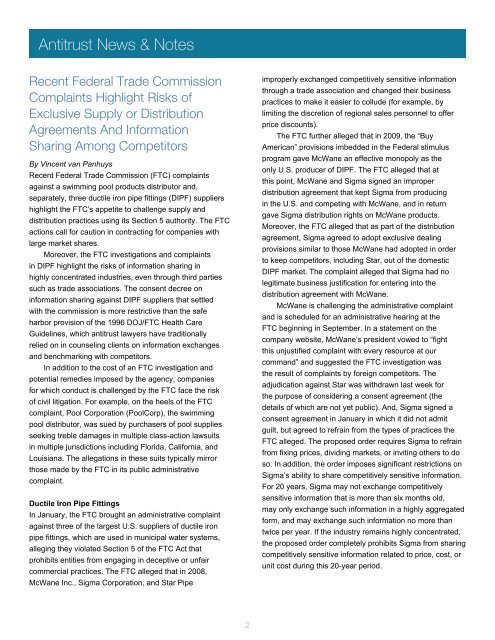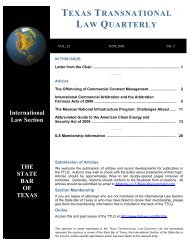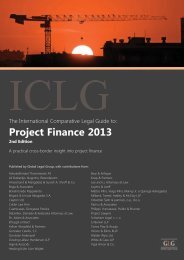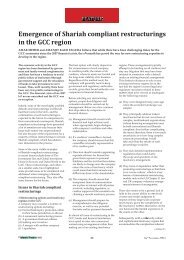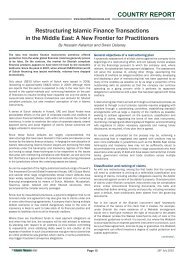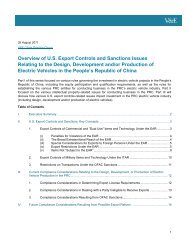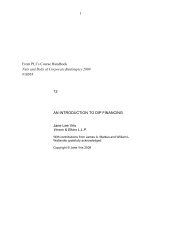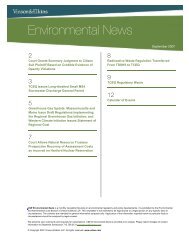Create successful ePaper yourself
Turn your PDF publications into a flip-book with our unique Google optimized e-Paper software.
Antitrust News & Notes<br />
Recent Federal Trade Commission<br />
Complaints Highlight Risks of<br />
Exclusive Supply or Distribution<br />
Agreements And Information<br />
Sharing Among Competitors<br />
By Vincent van Panhuys<br />
Recent Federal Trade Commission (FTC) complaints<br />
against a swimming pool products distributor and,<br />
separately, three ductile iron pipe fittings (DIPF) suppliers<br />
highlight the FTC’s appetite to challenge supply and<br />
distribution practices using its Section 5 authority. The FTC<br />
actions call for caution in contracting for companies with<br />
large market shares.<br />
Moreover, the FTC investigations and complaints<br />
in DIPF highlight the risks of information sharing in<br />
highly concentrated industries, even through third parties<br />
such as trade associations. The consent decree on<br />
information sharing against DIPF suppliers that settled<br />
with the commission is more restrictive than the safe<br />
harbor provision of the 1996 DOJ/FTC Health Care<br />
Guidelines, which antitrust lawyers have traditionally<br />
relied on in counseling clients on information exchanges<br />
and benchmarking with competitors.<br />
In addition to the cost of an FTC investigation and<br />
potential remedies imposed by the agency, companies<br />
for which conduct is challenged by the FTC face the risk<br />
of civil litigation. For example, on the heels of the FTC<br />
complaint, Pool Corporation (PoolCorp), the swimming<br />
pool distributor, was sued by purchasers of pool supplies<br />
seeking treble damages in multiple class-action lawsuits<br />
in multiple jurisdictions including Florida, California, and<br />
Louisiana. The allegations in these suits typically mirror<br />
those made by the FTC in its public administrative<br />
complaint.<br />
Ductile Iron Pipe Fittings<br />
In January, the FTC brought an administrative complaint<br />
against three of the largest U.S. suppliers of ductile iron<br />
pipe fittings, which are used in municipal water systems,<br />
alleging they violated Section 5 of the FTC Act that<br />
prohibits entities from engaging in deceptive or unfair<br />
commercial practices. The FTC alleged that in 2008,<br />
McWane Inc., Sigma Corporation, and Star Pipe<br />
improperly exchanged competitively sensitive information<br />
through a trade association and changed their business<br />
practices to make it easier to collude (for example, by<br />
limiting the discretion of regional sales personnel to offer<br />
price discounts).<br />
The FTC further alleged that in 2009, the “Buy<br />
American” provisions imbedded in the Federal stimulus<br />
program gave McWane an effective monopoly as the<br />
only U.S. producer of DIPF. The FTC alleged that at<br />
this point, McWane and Sigma signed an improper<br />
distribution agreement that kept Sigma from producing<br />
in the U.S. and competing with McWane, and in return<br />
gave Sigma distribution rights on McWane products.<br />
Moreover, the FTC alleged that as part of the distribution<br />
agreement, Sigma agreed to adopt exclusive dealing<br />
provisions similar to those McWane had adopted in order<br />
to keep competitors, including Star, out of the domestic<br />
DIPF market. The complaint alleged that Sigma had no<br />
legitimate business justification for entering into the<br />
distribution agreement with McWane.<br />
McWane is challenging the administrative complaint<br />
and is scheduled for an administrative hearing at the<br />
FTC beginning in September. In a statement on the<br />
company website, McWane’s president vowed to “fight<br />
this unjustified complaint with every resource at our<br />
command” and suggested the FTC investigation was<br />
the result of complaints by foreign competitors. The<br />
adjudication against Star was withdrawn last week for<br />
the purpose of considering a consent agreement (the<br />
details of which are not yet public). And, Sigma signed a<br />
consent agreement in January in which it did not admit<br />
guilt, but agreed to refrain from the types of practices the<br />
FTC alleged. The proposed order requires Sigma to refrain<br />
from fixing prices, dividing markets, or inviting others to do<br />
so. In addition, the order imposes significant restrictions on<br />
Sigma’s ability to share competitively sensitive information.<br />
For 20 years, Sigma may not exchange competitively<br />
sensitive information that is more than six months old,<br />
may only exchange such information in a highly aggregated<br />
form, and may exchange such information no more than<br />
twice per year. If the industry remains highly concentrated,<br />
the proposed order completely prohibits Sigma from sharing<br />
competitively sensitive information related to price, cost, or<br />
unit cost during this 20-year period.<br />
2


